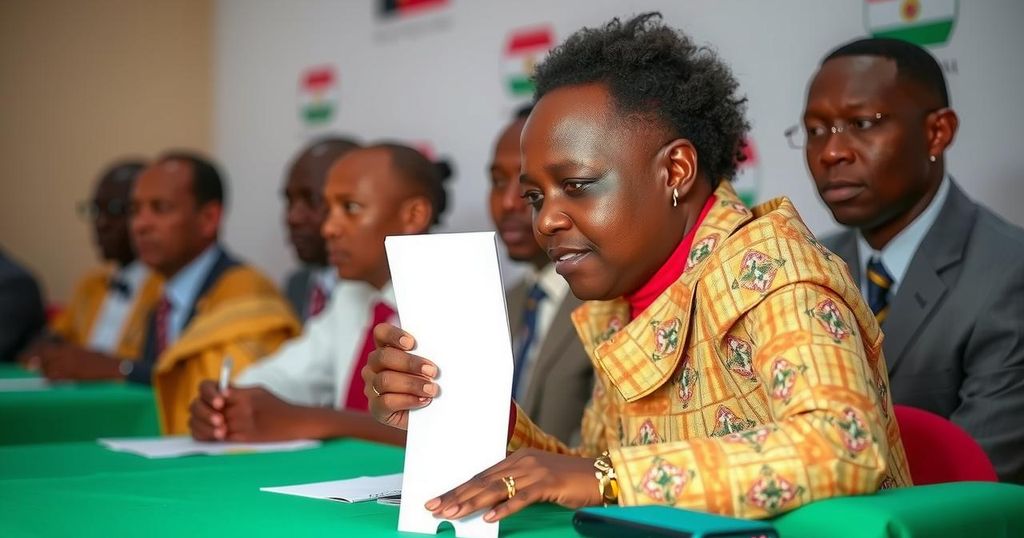Chad’s First Parliamentary Elections in Over a Decade: Context and Controversies
Chadians are voting in parliamentary elections for the first time in over a decade amid claims of oppression from opposition parties. The elections, set against a backdrop of economic hardship and security challenges, are viewed by many as a means for the ruling MPS to legitimize its power. With significant opposition boycotts, the elections are shrouded in skepticism regarding their fairness and inclusivity.
Chadians are participating in parliamentary, regional, and municipal elections for the first time in over a decade, marking a significant moment in the transition to democracy after the military took power following the death of long-time ruler Idriss Deby Itno in 2021. The election process has been marred by skepticism and opposition boycotts, as many parties deem the elections a facade legitimizing a political dynasty. The governing Patriotic Salvation Movement (MPS) is expected to maintain its control over parliament amid a backdrop of security challenges and accusations of repression against opposition voices.
The current elections follow a history of delays, with the last parliamentary elections held in 2011 and initial scheduling disruptions largely attributed to financial constraints and the COVID-19 pandemic. Despite being rich in oil resources, Chad remains one of the poorest nations in Africa, facing not only economic hurdles but also escalating security issues from neighboring conflicts and domestic unrest. Opposition groups, frustrated by years of postponement and lack of inclusivity, have declared they will boycott the elections, asserting that the process is rigged to favor the ruling party.
The international community and various rights organizations have voiced deep concerns regarding the implications of an unrepresentative electoral process, emphasizing the need for inclusive participation to foster a fair environment. Amnesty International’s Nigeria director stated, “It will be difficult to have a credible election without inclusivity,” stressing the importance of including all political voices in this critical democratic endeavor. Furthermore, Chadian journalists are protesting a recent media ban limiting their ability to report on the elections, thereby raising further concerns about freedom of the press and expression in the country.
The MPS, led by Haroun Kabadi, is on track to secure a parliamentary majority, reinforcing the Deby family’s longstanding grip on power. As opposition parties prepare to independently monitor the electoral process in light of their boycott, the future of Chad’s political landscape remains precarious. Rights advocates continue to urge for an electoral environment that is genuinely both free and fair, a prerequisite for authentic democratic governance in Chad.
Chad’s journey towards democratic governance has been tumultuous, characterized by military coups and extended periods without parliamentary elections, the last of which occurred in 2011. A transitional military council took the reins following the 2021 death of President Idriss Deby Itno, leading to the formal electoral process being delayed for over a decade due to financial issues and the global pandemic. As the country attempts to redefine its political landscape, various opposition parties have expressed skepticism regarding the legitimacy of the upcoming elections, citing the need for a more inclusive process. The political scene is further complicated by security tensions, including conflicts from neighboring Sudan and threats posed by groups such as Boko Haram, making the restoration of democracy a particularly daunting challenge for Chad.
The upcoming parliamentary elections in Chad represent a pivotal moment as the nation seeks to emerge from years of military rule and postponed democracy. However, the political landscape is rife with skepticism due to widespread opposition boycotts and complaints regarding the fairness of the electoral process. As international observers call for inclusivity and oversight, the MPS appears poised to consolidate its power, raising questions about the future of authentic democratic governance in Chad. The outcome of these elections will be essential in determining whether the country can overcome its historical challenges and align itself with a more democratic trajectory.
Original Source: www.aljazeera.com




Post Comment